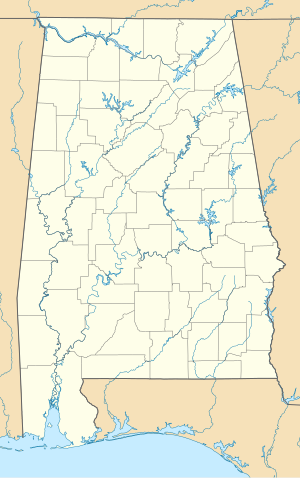Brookley Air Force Base
| Brookley Air Force Base | |
|---|---|
| Part of Air Force Logistics Command (AFLC) | |
| Located near: Mobile, Alabama | |

Brookley Air Force Base - 7 April 1952
|
|
| Coordinates | 30°37′36″N 088°04′05″W / 30.62667°N 88.06806°W |
| Site information | |
| Controlled by |
|
| Site history | |
| Built | 1940 |
| In use | 1940-1969 |
Brookley Air Force Base is a former United States Air Force base located in Mobile, Alabama. After it closed in 1969, it became what is now known as the Mobile Aeroplex at Brookley.
Brookley Air Force Base had its aeronautical beginnings with Mobile's first municipal airport, the original Bates Field. However, the site itself had been occupied from the time of Mobile's founding, starting with the home of Mobile's founding father, Jean-Baptiste Le Moyne, Sieur de Bienville, in the early 18th century.
In 1938 the Army Air Corps took over the then 1,000-acre (405 ha) Bates Field site and established the Brookley Army Air Field. The military was attracted to the site because of the area's generally good flying weather and the bay-front location, but Alabama Congressman Frank Boykin's influence in Washington was important in convincing the Army to locate the new military field in Mobile instead of Tampa, Florida. However, later that year, Tampa was also chosen for a military flying installation of its own, which would be named MacDill Field, home of present-day MacDill Air Force Base.
During World War II, Brookley Army Air Field became the major Army Air Forces supply base for the Air Material Command in the southeastern United States and the Caribbean.
Many air depot personnel, logisticians, mechanics, and other support personnel were trained at Brookley during the war. Both Air Materiel and Technical Services Command organized mobile Depot Groups at Brookley, then once trained were deployed around the world as Air Depot Groups, Depot Repair Squadrons, Quartermaster Squadrons, Ordnance Maintenance, Military Police, and many other units whose mission was to support the front-line combat units with depot-level maintenance for aircraft and logistical support to maintain their operations. Air Transport Command operated large numbers of cargo and passenger aircraft from the base as part of its Domestic Wing.
...
Wikipedia


